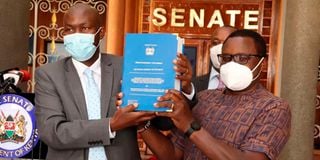Premium
Spirited debate and foreboding on BBI

Speaker of the Senate Kenneth Lusaka (right) receives BBI report from Senator Okongo Omogeni at Parliament Buildings on April 26, 2021.
On Wednesday, debate on the BBI Bill opened in both the National Assembly and the Senate. The proceedings are superfluous since whether the Bill is passed or not, a referendum is inevitable. So heated was the debate that it is scheduled to continue this week. Ahead of the vote, the process has been dogged by confusion: Different copies of the BBI Bill said to be circulating. County assemblies voting on different versions of the Bill. Errors in the drafts, including clauses that don't exist in the Constitution. And so on.
Where did the errors originate from? Who was responsible? The Bill went through various stages: drafting, the Building Bridges Initiative (BBI) secretariat, signature collection, Government Printer, the Independent Electoral and Boundaries Commission (IEBC), county assemblies. Then it went to Parliament, where it was scrutinised by experts hired by the Joint Legal Affairs committee (at which point the errors were unmasked) before coming before plenary.
Assuming the errors were introduced at the drafting stage, how on earth did they escape detection at the BBI secretariat and IEBC? A case of sheer incompetence? Or deliberate mischief? Or sabotage?
Five-judge bench
Where we are now, the fate of the BBI Bill hangs with a five-judge High Court bench that will rule on several consolidated cases filed against the initiative.
The judges have in the interim issued two rulings that are a foreboding of what could lie in store.
In the first instance they ordered the IEBC not to make any preparations for the referendum – as yet.
Second, they ruled that the President should not assent to the Bill until the cases are determined.
Have President Uhuru Kenyatta and his Handshake partner Raila Odinga seriously considered the very real possibility that their BBI project could be scuttled altogether by the five judges? That is notwithstanding the fact that BBI has become the key plank of Uhuru’s second term, indeed of his legacy. And of Raila’s too.
A nullification would put paid to their three-year push, post-Handshake, to build momentum for a referendum. Any caveats raised in Parliament will only give ammunition to the court to overturn BBI.
The appeals process will certainly mess up the BBI timelines.
The most intense disputation has centred on the 70 extra constituencies proposed by the BBI Bill. The parliamentary Legal Affairs committee, while recommending the Bill be passed, nonetheless cited the allocations as "unconstitutional" on the basis that they usurped IEBC's elaborately defined role under Section 89.
Nairobi Senator Johnson Sakaja countered with a "minority report" whose gist was that nothing about amending a constitution was unconstitutional, as long as the "foundational structure" of the Kenyan state was not altered.
On the proposed constituencies, Sakaja argued that the BBI promoters were within their rights in allocating them without interfering with the IEBC's core function of delimitation.
In-built unconstitutionality
At bottom, the argument of the BBI's proponents is that a provision that is "unconstitutional" under the current Constitution will become "constitutionalised" when passed in a referendum.
"There's nothing unconstitutional if it comes from the people," said National Assembly Majority Leader Amos Kimunya. That would mean Wanjiku even deciding to scrap Parliament!
Senior Counsel and Rarieda MP Otiende Amollo has previously introduced an interesting dimension. Suppose, he posed, a popular initiative-driven Bill has an in-built unconstitutionality? Such as, hypothetically, a proposal for the Presidency to remain a preserve of two communities?
Now that would be abnormal, not merely unconstitutional. Such abnormalities can be snuffed out at the outset by other moderating forces – societal conscience being one.
Barring such aberrations, Omollo's argument rests on the premise that there are certain core principles that define a constitution, like the sovereignty of the people. Indeed.
The implication is that we would have to write an entirely new constitution if we were to change those core principles.
However, constitutions are not sacrosanct. Everything is amendable, including that sovereignty of the people principle. The constitution actually caters for that article to be amended via a referendum. (Conceivably we can opt for a monarchy). Even the US constitution is not inviolable. It has been amended 27 times in its history. Of note is that the US does not amend its constitution through national referendums. It does so through a combined initiative of Congress and state legislatures. Kenya goes one better by requiring a direct say by ordinary citizens themselves.
70 constituencies
It's common to have ambiguity between a constitutional amendment and existing clauses, as has been noted in the role of the IEBC and the creation of the 70 BBI constituencies.
However in most jurisdictions, the article of amendment takes precedence over the related provisions of the original text.
The agreed wisdom is that the Bill, being a popular initiative, cannot be tampered with in the National Assembly or Senate. It was the same case in the county assemblies, where no alterations could be done to the Bill.
* * * * *
US Secretary of State Anthony Blinken had a virtual meeting with the Kenyan leadership last week. One of the topics was refugees. Please, please Kenya government, don't agree to be bullied to reverse the earlier demand to the UN to close the refugee camps as per the deadline: June 30, 2022.
@GitauWarigi





